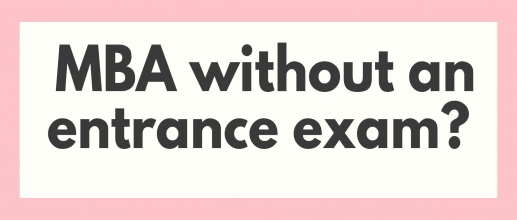
The higher education landscape is undergoing a significant transformation with the rise of online learning platforms. As a result, the traditional norms associated with pursuing an MBA are being challenged. Many institutions are now reconsidering the once stringent requirement of clearing an entrance exam to gain admission into an MBA program.
The feasibility of pursuing an online MBA without an entrance exam is a topic of great interest and debate among prospective students and academic professionals alike. On the one hand, removing the entrance exam requirement can make the program more accessible to individuals who possess relevant work experience but may not have the resources or time to dedicate to exam preparation. This inclusivity can bring diverse perspectives and experiences to the program, enhancing the learning environment.
Moreover, eliminating the entrance exam can provide greater flexibility for working professionals who wish to pursue an MBA while balancing their existing work commitments. By alleviating the pressure of exam preparation, candidates can focus on managing their professional and personal responsibilities, making online MBA programs a viable option for those who seek career advancement without interrupting their current employment.
Advantages of an Online MBA without an Entrance Exam:
Increased Accessibility
Pursuing an online MBA without an entrance exam offers increased accessibility to a broader pool of prospective students. By eliminating the requirement for an entrance exam, institutions can attract individuals who possess relevant work experience but may need more resources or time to prepare for a standardized test. This approach promotes inclusivity and diversity within the MBA program, fostering a more prosperous learning environment. Students from various backgrounds and industries can contribute their unique perspectives, creating a dynamic and collaborative academic community. The removal of the entrance exam requirement ensures that deserving candidates, who the exam's demands may have deterred, have a fair opportunity to pursue an MBA and enhance their career prospects.
Flexibility for Working Professionals
For working professionals aspiring to pursue an MBA, the absence of an entrance exam offers a significant advantage in terms of flexibility. Many individuals considering an MBA are already engaged in full-time employment, and preparing for an entrance exam alongside their professional responsibilities can be challenging. By waiving the entrance exam requirement, online MBA programs enable working professionals to focus on managing their existing work commitments while pursuing their studies. This flexibility allows them to balance work and education, eliminating potential conflicts and reducing stress. It empowers individuals to advance their careers without interrupting their professional growth, creating a seamless integration of academic pursuits and work responsibilities.
Emphasis on Professional Experience
An online MBA without an entrance exam strongly emphasizes candidates' professional experience. For individuals with significant work experience, the relevance and utility of entrance exams can be redundant. By prioritizing and evaluating candidates based on their professional achievements, leadership qualities, and industry experience, online MBA programs can identify those who can contribute meaningfully to the program. This approach recognizes that success in the business world extends beyond the ability to perform well on a standardized test. It values real-world accomplishments and capabilities, ensuring that candidates with a wealth of practical knowledge and industry insights can enhance their skills and positively impact their chosen field.
Top Colleges Offering Online MBA Admission for Working Professionals without entrance exam
How do you apply for an online MBA?
Applying for an online MBA program typically involves several steps. Here's a general guide on how to use an online MBA:
Some renowned and prestigious institutions may have higher application fees due to their brand value and reputation in the market. On the other hand, relatively newer or less well-known institutions may have lower application fees to attract a larger pool of applicants.
In some cases, the admissions process may include an interview as an additional step in the selection process. If you are selected for an interview, it is essential to prepare thoroughly. Research the program thoroughly to familiarize yourself with its curriculum, faculty, and specific focus areas. You will demonstrate your genuine interest and commitment to the program during the interview.
Acceptance and Enrollment: Once your application for an online MBA program is accepted, you will receive an offer of admission. Review the offer letter carefully, noting details on tuition, program requirements, and deadlines. Be attentive to any additional steps or documentation required.
Once you have taken the offer, you will receive further information on attending online classes, projects, and internships (if applicable). Staying organised, meeting deadlines, and communicating with the admissions office or program coordinators for clarifications or assistance is essential.
It's important to note that the application process may vary slightly between different institutions and programs. Therefore, carefully review the specific application instructions provided by each program you are interested in and follow them accordingly.
Challenges Faced by Students Pursuing an Online MBA
Time Management: One of the significant challenges for students pursuing an online MBA is effectively managing their time. Online MBA students often have various responsibilities, such as work, family, and personal commitments, making allocating sufficient time for coursework challenging. To address this challenge, students can employ the following strategies:
Self-Motivation: Online learning requires self-motivation and discipline since no fixed class schedules or face-to-face interactions with professors exist. To stay motivated throughout the program, students can adopt the following strategies:
Conclusion:
Pursuing an online MBA without an entrance exam represents a departure from standard admission requirements, focusing instead on professional experience, achievements, and other indicators of aptitude. While this approach offers benefits such as increased accessibility and flexibility, it also challenges maintaining academic standards and ensuring cohort quality. As the education landscape evolves, institutions must carefully evaluate the trade-offs involved, balance inclusivity, and keep the rigour and integrity of their MBA programs. Ultimately, the decision to pursue an online MBA without an entrance exam should be based on an individual's specific circumstances and goals, weighing the advantages and disadvantages of such an approach.